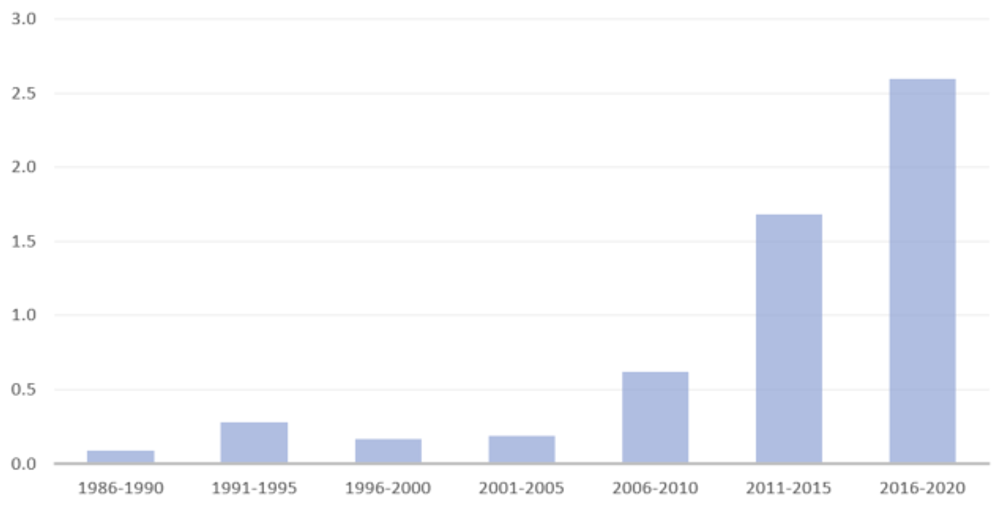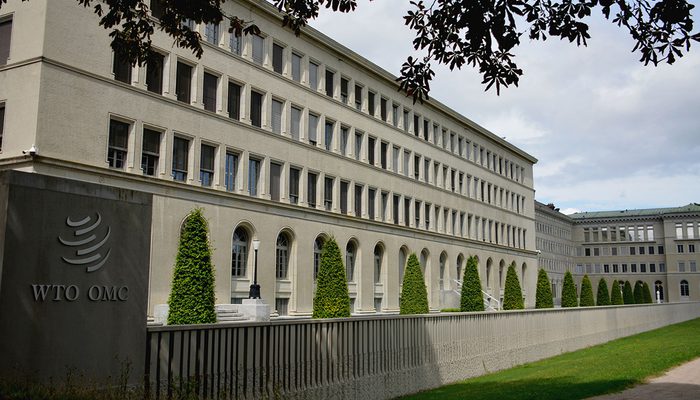Preferential trade agreements can be used as a policy tool to promote climate action. Negotiators should improve the design of climate-related provisions to unlock their full potential and also draw lessons for trade and climate discussions at the WTO.
Linking trade to environmental goals is gaining momentum. Ever more discussion about trade and climate interlinkages are prevalent in both the trade and climate policy communities. Climate change is increasingly discussed at the World Trade Organization (WTO). The dedicated Trade Day at the 2023 United Nations Climate Change Conference (COP28), which will be followed by a Trade and Investment Day and a Trade House/Pavilion at COP29 in Azerbaijan in November this year, underlines the growing interest in trade and climate change interlinkages. Given the urgency of the climate crisis, using the toolbox of trade policies to help tackle climate change should be a priority.
Preferential trade agreements (PTAs) are a promising trade policy tool to accelerate the transition towards greener economies and help address the climate crisis. The growing number of PTAs around the world include more and more environmental provisions, often with greater scope than relevant provisions in the WTO. These provisions can help reduce environmentally harmful subsidies, incentivize the green transition, and favour the diffusion of environmental technologies among other objectives.
Preferential trade agreements offer the opportunity to experiment with innovative ways to use trade policies to tackle climate change.
PTAs offer the opportunity to experiment on a limited scale with innovative ways to use trade policies to tackle climate change. Successful experiments can be replicated in other trade agreements and inspire multilateral negotiations at the WTO. The Comprehensive and Progressive Agreement for Trans-Pacific Partnership (CPTPP), for example, contained fisheries subsidies rules a few years before the Agreement on Fisheries Subsidies was concluded at the WTO.
So far, however, climate-related environmental provisions in PTAs have not been designed in ways that enable them to live up to this potential. Many such climate provisions in PTAs remain vague, weak, and not very innovative. How can negotiators improve the design of climate-related provisions to unlock their full potential and what can we learn for the multilateral setting?

Average Number of Climate-Related Provisions in Preferential Trade Agreements (Brandi et al. 2024)
Trade Tools to Promote Climate Action
Three types of provisions have the potential to strengthen climate protection through PTAs:
- Fossil fuel subsidies. Climate provisions in PTAs should seek to eliminate or phase down fossil fuel subsidies, provide for special and differential treatment for developing countries, and increase transparency on fossil fuel subsidies.
- Environmental goods and services. Climate provisions in PTAs should liberalize environmental good and services, offer special and differential treatment for developing countries in the context of such liberalization, and incentivize climate-friendly production through preferential tariffs. However, climate provisions in PTAs should eliminate not only tariffs but also non-tariff trade barriers for environmental goods and services. For example, PTAs can foster regulatory cooperation, harmonization (in certain limited cases), equivalences, or mutual recognition agreements of conformity assessment procedures. Precedents exist for clean energy, for example in the EU-Japan Economic Partnership Agreement and the United States-Mexico-Canada Agreement (USMCA). At the same time, there is potential to do more. There should be a focus on areas of cooperation beyond a narrow market access agenda, such as by using PTAs to promote technology cooperation, capacity building, and financing to foster climate action.
- Investment. Climate provisions in PTAs should be designed to shield climate policy measures from legal challenge by providing a treaty-wide exception specifically for climate policy measures. This should reaffirm the right to regulate explicitly concerning climate policy measures or carving out measures taken to address climate change from the application of investor-state dispute settlement.
So far, climate-related environmental provisions in preferential agreements have not been designed in ways that enable them to live up to their potential.
Promoting the Effectiveness of Climate Provisions
In view of the urgency of the climate crisis, addressing the trade-climate interface should be a priority for the trade and climate policy communities. The following five recommendations are key for enhancing the effectiveness of climate provisions in PTAs:
- Focus on win-win solutions. Several trade commitments can lead to adverse environmental consequences. Trade negotiators should include environmental exceptions in all chapters of any trade agreement, including in chapters related to foreign investment, and should protect the capacity of states to regulate the environment. Moreover, future PTAs should focus on win-win issues such as the progressive reduction of fossil fuel subsidies or better access to environmental technologies that generate synergies between trade and the environment.
- Promote participation of non-state actors. There is a need to boost cooperation with civil society, from the formulation to monitoring of trade agreements, for example by strengthening domestic advisory groups.
- Boost capacity building and assistance. Policymakers in high-income countries should offer assistance to low- and middle-income countries for implementing the environmental provisions in their PTAs. By now, 14% of the 775 examined PTAs include provisions on technical assistance and capacity building. In addition, 10% also include financial or technology transfer commitments. For example, the US regularly offers assistance through several different measures, including training in resource management and environmental enforcement, public awareness campaigns, the transfer of environmentally friendly technologies, assistance for the creation of protected areas, and legal advice on new environmental laws.
- Improve impact assessment, data, and knowledge diffusion. Policymakers should conduct regular ex post environmental assessments of agreements every 5 or 10 years. This would provide for better learning opportunities, even in cases where measures are unsuccessful or disappointing in their results. Interactive visualization tools such as TREND Analytics can help make data on environmental provisions more easily accessible to trade negotiators, environmental NGOs, the private sector, and the wider public.
- Foster compliance and enforcement. Concrete actions are required to ensure that existing PTAs are effectively implemented and enforced, both generally and specifically in the context of environmental provisions. For instance, the USMCA includes a robust dispute settlement mechanism that allows parties to challenge each other’s compliance with the agreement, with the possibility of financial penalties and retaliation. Such sanctions-based approaches can be combined with softer cooperative measures. In addition to intergovernmental mechanisms, civil society participation can help promote implementation. In the EU, for example, domestic advisory groups representing various branches of civil society are set up to help monitor and provide advice on implementation.
What Can We Learn for the WTO?
Preferential trade agreements can serve as laboratories in which trade negotiators experiment with new provisions before they are incorporated into the WTO rulebook. The multilateralization of PTA provisions may seem unlikely given the existing legislative gridlock in the WTO. However, recently, a new dynamic has emerged in the WTO context at the trade-environment nexus, including through the member-led Trade and Environmental Sustainability Structured Discussions (TESSD) among other initiatives. TESSD has an informal working group, for example, dedicated to member practices in the development of trade-related climate measures.
Looking ahead, regular dialogue between climate experts and trade negotiators can provide a basis for mutually beneficial exchanges that can help pave the way for multilateral progress on trade and climate. For example, the Coalition of Trade Ministers on Climate, which brings together over 60 trade ministers from different regions and varying levels of development, and which has issued a menu of voluntary trade-related actions to address the climate crisis, can strengthen international dialogue and coordinate strategies, options, and best practices for aligning climate and trade policies.
----------
Jean-Frédéric Morin is Full Professor at the Political Science Department of Laval University, Québec City, Canada.
Clara Brandi is Head of Programme, Transformation of Economic and Social Systems, German Institute of Development and Sustainability (IDOS) and Professor of International and Development Economics at the University of Bonn, Germany.
-----
Synergies by TESS is a blog dedicated to promoting inclusive policy dialogue at the intersection of trade, environment, and sustainable development, drawing on perspectives from a range of experts from around the globe. The editor is Fabrice Lehmann.
Disclaimer
Any views and opinions expressed on Synergies are those of the author(s) and do not necessarily reflect those of TESS or any of its partner organizations or funders.
License
All of the content on Synergies is licensed under a Creative Commons Attribution-NonCommercial-ShareAlike 4.0 International (CC BY-NC-SA 4.0)
license. This means you are welcome to adapt, copy, and share it on your
platforms with attribution to the source and author(s), but not for
commercial purposes. You must also share it under the same CC BY-NC-SA
4.0 license.
If you would like to reuse any material published here or if you have any other question related to Synergies, send an email to fabrice.lehmann@graduateinstitute.ch.
TESS at the World Trade Organization
This work is part of our initiative supporting inclusive cooperation
on trade, environment, and sustainable development at the WTO.






